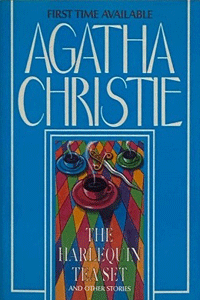In what must’ve felt like a long overdue publication to U.S. readers, “The Harlequin Tea Set and Other Stories” finally gathered up the last (except for a few oddities) of Agatha Christie’s underpublished short stories in 1997.
A much-improved expansion
These nine tales aren’t the dregs of her catalog, though. On the contrary, the book includes fascinating curiosities, plus a story that deserves consideration for being her best yarn that’s not a full novel: “The Mystery of the Spanish Chest.”
In 1960 for a U.K. collection, Christie significantly expanded this short from “The Mystery of the Bagdad Chest” (that 1932 version was collected in 1939’s “The Regatta Mystery and Other Stories”). The replacement of Hastings with Miss Lemon is arguably superficial, but Christie’s expansion of the suspects via interviews enriches the tale.

“The Harlequin Tea Set and Other Stories” (1997)
Author: Agatha Christie
Genre: Mystery and romance short stories
Series: Hercule Poirot (“The Mystery of the Spanish Chest”), Harley Quin (“The Harlequin Tea Set”)
Settings: England, 1920s and ’30s
The brilliantly crafted mystery is still in place, even with Poirot (in his only appearance in this collection) sighing every time a witness assumes the police’s main suspect had to have done it – because who else could have? This longer version more pointedly emphasizes the fascinating twist wherein the killer tries to take advantage of interlocking relationships between other partygoers.
Catching up with Mr. Quin
Up next in the category of “Why so long till it was published?” is the title yarn, “The Harlequin Tea Set.” It’s chronologically the last Harley Quin story and the only one not collected in 1930’s “The Mysterious Mr. Quin.” It was published in book form in the U.K. in 1971, but it remains a mystery as to when Christie wrote it.
The author is more enamored with the idea of Quin as a spirit guide to Mr. Satterthwaite than I am. It strikes me that she’s always forcing this notion. Satterthwaite praises Quin for being such a great mentor and Quin deflects the praise back on Satterthwaite, whom he claims does all the people-reading mystery-solving on his own.
Quin can be seen by other people, so if he is a spirit, he’s not linked only to Satterthwaite. Purposefully, Christie never definitively tells us what type of entity Quin is, so your mileage will vary on whether that’s satisfying.
A golden oddity
For sheer oddity value, we have “Manx Gold.” This is among the least enjoyable Christie short stories, but the story behind it is intriguing. She wrote it in installments for The Daily Dispatch, the newspaper of the Isle of Man, in 1930.
As two characters search for four snuffboxes containing tickets that can be redeemed for serious cash at the local bank, tourists to the island are asked to likewise follow the clues. But Christie skips over the locations where the characters actually find each box, as the locations aren’t to be revealed till the contest’s end.

Thus, “Manx Gold” purposefully has plot holes. The contest was further made awkward when people discovered some of the boxes via sheer luck before Christie’s installment with the requisite clues. It was a failed experiment as both a work of fiction and a real-world contest, but certainly a fascinating entry in Christie’s biography and bibliography.
Character studies
Elevating this collection, though, are the early entries where Christie is in Mary Westmacott (non-mystery) form, exploring the way humans relate to each other – particularly the way romantic interests circle each other and strategize.
They aren’t all perfect examples of this genre – it’s debatable whether Christie sticks some of the landings – but they are engaging. My favorite is “The Lonely God” (1926), wherein an unconfident 40-something bachelor and a shy 20-something street waif gradually form a bond while playfully praying to a depressed-looking stone idol at a monument park.
Also of note is “The Edge” (1927). It’s ultimately a morality play of sorts. But before that we follow the compelling decision process of a woman who loves a married man and discovers his wife has cheated on him. Should she reveal this information or hold on to it? What is her moral duty? Christie slyly asks if selfish motives come into play.
Not merely the last of Christie’s U.S. short-story collections, “The Harlequin Tea Set” includes enough antique gems to make a case for being among the best.
Sleuthing Sunday reviews an Agatha Christie book or adaptation. Click here to visit our Agatha Christie Zone.

